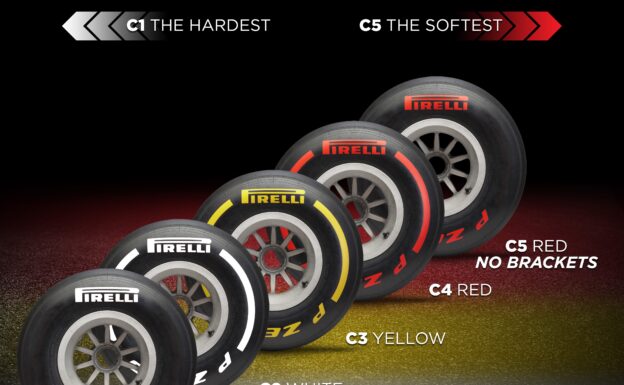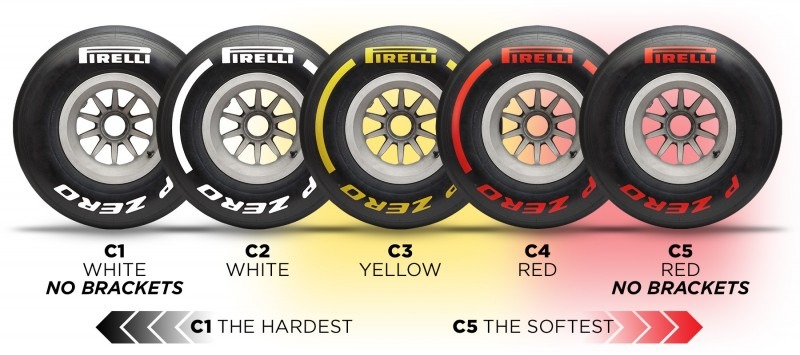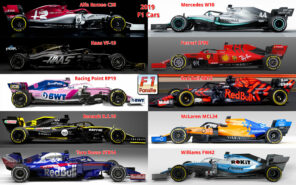Pirelli's uses 5 tyre compounds during testing

This year will be the ninth season of the current Pirelli era, and during each of those years the tyre range has always been different from one season to the next. So, what can we expect that’s new from the latest range of tyres – which make their debut on the 2019 cars in Barcelona this week?
Pirelli's three colours & five tyre compounds
There will be only three colours at each 2019 race: white for the hardest compound of the weekend, yellow for the medium one, and red for the softest compound. In total, there will be five compounds available for the year: they are numbered from 1 to 5, going from hardest to softest. As all five compounds are on track at the pre-season test in Barcelona, the hardest (C1) and the softest (C5) compounds won’t carry the usual stripes during the test. Compounds C2, C3 and C4 will instead carry the usual branding with stripes: coloured white, yellow and red respectively. This will only happen during tests: for grand prix weekends there will be just three compounds at each race.
Prototypes for testing
There will also be some tyres that don’t carry any markings at all: these will be prototype tyres that will be seen during tests only to assess potential evolution's for the future. There is a bespoke test schedule currently being finalised for 2020, which will involve all the teams in a series of sessions this year. Details of this schedule will be released shortly.
Different temperatures and pressures
A new move for this year is to reduce the maximum temperature of the tyre blankets at the rear to 80 degrees centigrade, while the front tyre blanket temperature will remain at the current 100 degrees centigrade. This will help front tyre warm-up, and also reduce the risk of graining: especially in low ambient temperatures. As a result, the starting pressures of the rear tyres have been reduced accordingly.
Thinner treads
There was a thinner tread used at selected races last year, which featured new asphalt. This was designed to prevent overheating, with the objective successfully achieved. As a result, a similar tread reduction has been adopted for all the 2019 tyres. The tyre constructions will therefore be exactly the same at every race this year.
New intermidiates and wets
There’s a brand new intermediate tyre for this year, which is designed to cover a wider range of conditions than its predecessor. This makes for a much more effective crossover point with both the slick and the full wet tyres, as well as improved performance in the wet. The full wet tyre is also entirely new, with a redesigned profile that offers greater resistance to aquaplaning and better drive-ability in heavy rain.
No wet back-ups
Last year, two parallel ranges of wet and intermediate tyres were homologated: one for higher temperatures and one for lower temperatures. This year, the tyres have been made more versatile so there is no need to have two ranges: there’s only one intermediate tyre and one full wet tyre for the whole year.
Wider working ranges
The working ranges are a bit higher for this year in order to reduce the potential for overheating. This ensures that overall there is a wider operating window as well.
C1 110-140°C
C2 110-135°C
C3 105-135°C
C4 90-120°C
C5 85-115°C
(C1 the hardest compound, C5 the softest)
✅ Check out more posts with related topics:
















Want tyres
✅ Checkout the latest 50 F1 Fans comments.